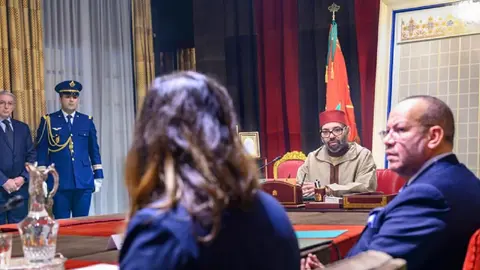Morocco prepares for post-earthquake reconstruction

A week after the devastating 7-magnitude earthquake that killed 3,000 people and injured more than 5,000, Morocco is beginning to look to the future and reconstruction work. In this regard, King Mohammed VI chaired a meeting to discuss plans for the resettlement of earthquake victims in the five affected provinces in a "strong, rapid and proactive" manner.
جلالة الملك يترأس اجتماع عمل خصص لتفعيل البرنامج الاستعجالي لإعادة إيواء المتضررين والتكفل بالفئات الأكثر تضررا من زلزال الحوز
— TheMoroccanMonarchy (@M_RoyalFamily) September 14, 2023
His Majesty King Mohammed VI chaired working meeting devoted to activating the emergency program for rehousing the earthquake victims pic.twitter.com/4D7oLh4n6K
It is estimated that around 6,000 houses have been completely destroyed, while another 20,000 have been partially affected by the quake, according to figures provided by the Minister of Housing, Fatima-Zahra Mansouri, to Media24.
The plan set out in the session also provides for temporary emergency housing for citizens who have lost their homes. These houses are to be designed to withstand cold and bad weather as the autumn months approach.
The resettlement plan also includes urgent reconstruction actions to be carried out immediately after land preparation and stabilisation. The country plans to provide direct financial assistance of 140,000 dirhams ($13,800) for completely collapsed houses and 80,000 dirhams ($8,000) to cover the reconstruction of partially destroyed houses.
Similarly, in order to boost reconstruction efforts, the Kingdom will allocate 30,000 dirhams ($3,000) in aid to affected households, the state news agency MAP announced. In his personal capacity, Mohammed VI has also donated 1 billion dirhams ($100 million) to the special fund to help earthquake victims.
Le Maroc est le pays le plus solidaire.
— CHAHINAZE🐻 (@Chahinaze92) September 11, 2023
Al hamdouliLah 🫶🏽 pic.twitter.com/OWZgfLQ682
The reconstruction work will be carried out in accordance with the architectural and cultural identity of the region, as well as security measures.
During the meeting, the King also stressed the importance of improving infrastructure and the quality of public services in the affected areas and ordered that children orphaned by the disaster be granted the status of Guardians of the Nation.
According to Jawad el-Basri, president of the Order of Architects of Marrakech, quoted by RFI, priority for reconstruction is given to community facilities. "Schools, mosques and hospitals must be rebuilt as soon as possible," he told RFI. Roads, many of which were damaged or destroyed in the quake, are another important aspect of reconstruction.

Bouchaïb Safir, president of the Moroccan Road Association, told the French newspaper about the authorities' efforts to clear the roads. According to Safir, "an impressive mobilisation of personnel and machinery" was undertaken to clear these roads. The roads are key to the delivery of humanitarian aid, as well as the arrival of rescue teams in the affected areas.
Thanks to the work of the Moroccan Road Association, in coordination with the Ministry of Equipment and Public Works and Water, 80% of the roads cut since the earthquake have now been reopened.
🇲🇦Seisme #Maroc : Une semaine seulement après le tremblement de terre, la reconstruction a déjà commencé. Voici ce que les #médias_français vous cachent. Voilà la réponse à tous ceux qui critiquent ouvertement le royaume. #Maroc #Reconstruction #SolidaritéMaroc pic.twitter.com/4Vq0JN9ZRw
— 🇲🇦Maroc Defender (@Empirechrifien1) September 14, 2023
In addition to the reconstruction of housing and infrastructure, it has also become clear that tourism, a key sector of the Moroccan economy, needs to resume immediately. During a meeting between Hamid Bentaher, President of the National Confederation of Tourism, and Fatima Zahraa Ammor, Minister of Tourism, this issue was discussed, following directives from King Mohammed VI.
During the meeting, Ammor urged hotel owners to "technically inspect their buildings as soon as possible and take the necessary measures, where necessary, to bring them up to safety standards". In the aftermath of the earthquake, the Moroccan hotel sector has seen numerous cancellations and postponements of trips by foreign tourists.

In order to reverse this dynamic, the Moroccan National Tourist Office contacted tour operators and airlines to reassure them and encourage them to continue working with Moroccan destinations.
For its part, the Confederation of Tourism confirmed that airports, hotels and highways in the affected cities are ready to receive tourists and are operating normally, while most airlines operating in Morocco are continuing their work.










